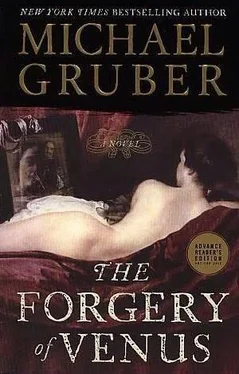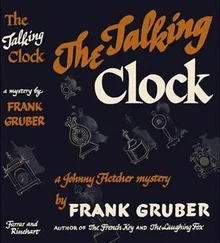After she was gone, Chaz showed me his work. His room had the street-side windows and for a few hours a day the light was fairly good and to obtain this light he had agreed to occupy the smaller of the two bedrooms, even though he was the lessee. There was an immense professional easel in it, a ratty pine table smeared with paint, a junky student desk, a brick-and-board bookcase, a plywood wardrobe, and a beautifully made antique brass bed, this last brought from home. One wall was covered with pegboard, from the hooks of which depended an astounding variety of objects: a stuffed pheasant, a German lancer’s helmet, a variety of necklaces, bracelets, tiaras, a stuffed beaver, an articulated human skeleton, swords, daggers, odd bits of armor, a large flintlock pistol, and an array of costumes representing the last half millennium of European dress, with a few tastes of the Orient thrown in. This collection, I soon gathered, was a mere overflow from his dad’s, who had a virtual museum of paintable objects installed in his studio at Oyster Bay.
The place stank of paint, gin, and cigarettes; Chaz was a heavy smoker-always Craven A’s in the red cardboard box-and you could see the yellow nicotine stains on his long fingers even through the omnipresent blots of paint. I still have a little self-portrait he did that year. I watched him do it, in fact, entranced: a few minutes staring at himself in a dusty mirror of a Broadway saloon and there he was-the pall of coarse black hair falling heavily over the broad forehead, the elegant straight nose, the long jaw, those remarkable large pale eyes. When I expressed appreciation he ripped it out of his sketchbook and handed it to me.
On that first afternoon, however, I woozily stood in front of his easel and caught my first sight of his work, which was a smallish painting of that naked girl done against an ochre ground. Without thinking I gasped and said it was terrific.
“It’s shit,” he replied. “Oh, it’s alive and all that, but overworked. Anyone can do a figure in oils. If you screw up, you just paint over it, and who cares if the paint is half an inch thick. The thing is to catch the life without trying, without any obvious working. Sprezzatura.”
He said the word lovingly, with a roll; I nodded sagely, since we were both being formed into little Renaissance manikins by the Columbia great books program and had both read Castiglione’s Courtier, with its admonition to achieve excellent results without showing obvious effort. One was languid, therefore, one whipped out brilliant papers at the last minute, one despised the sweaty grinds in the pre-med program. I should mention here that Chaz rather set the tone of our little community, which was as aesthetic as all get-out. The three of us were in the arts: Chaz painted, of course, and I was acting seriously at the time-I had some off-Broadway credits, in fact-and Mark had a Super 8 camera and was making short films of intense existential dreariness. In memory it was a lovely era: bad wine, worse marijuana, Monk on the record player and an endless stream of lanky girls in black tights and heavy eye makeup with straight hair down to their butts.
Strangely enough it was something Chaz did that knocked me out of acting for good. This was at the start of junior year, and they had brought in a visiting professor, a real Broadway director who was mad for Beckett. We did a series of his plays and I was Krapp in Krapp’s Last Tape . Chaz went to all three performances, not, I think, to support me, for we sold out the Minor Latham Playhouse straight through, but because he was genuinely fascinated with the idea of taping one’s whole life-of which more later. At the cast party I got into a drunken argument with some frat boy gate-crashers and there was a modest spasm of violence. The police were called, but Chaz hustled me out through the restaurant kitchen and back to our building.
We sat in his room and we drank some more, vodka out of the bottle, I recall, and I talked and talked until I noticed that he was looking at me peculiarly and I asked him what was wrong. He asked me whether I realized I was still in character, that I was using the querulous, middle-aged voice I had devised for Krapp. I tried to laugh it off, but the realization generated a deadly chill that penetrated through the booze. In fact, this happened to me a lot. I would get into a character and not be able to get out, and now someone else knew about it too. I changed the subject, however, and drank even more sincerely until I passed out in Chaz’s armchair.
And awoke to dawn and the sharp stink of turps. Chaz had set up a large canvas, maybe five feet by three, on his easel. He said, “Sit up, I want to paint you.” I did so; he adjusted the pose and began to paint. He was at it all day, until the light was gone, pausing only for the necessary toilet breaks and a Chinese meal delivered to the door.
I should say that although I had scrubbed the theatrical makeup off my face, I was still wearing powder in my hair and my Krapp costume of collarless white shirt, baggy dark trousers, and waistcoat with watch chain; and I’d grown a three-day beard to add to the seedy effect. I believe I said “Holy shit!” when at last he allowed me to see what he’d done. I’d taken the obligatory history of art survey course, and the apposite name popped into my head.
“Jesus, Chaz, you’re painting like Velázquez,” I exclaimed, with a peculiar combination of feelings: astonishment and admiration at the feat of art, and an absolute horror of the image itself. There was Krapp, with the impotent lust and malice playing on his face and the little lights of incipient madness around the eyes; and beneath this mask there was me with all the stuff I thought I had successfully hidden from the world staring out, naked. It was like the picture of Dorian Gray in reverse; I had to make myself look, and smile.
Chaz regarded it over my shoulder and said, “Yeah, it’s not bad. A little sprezzatura working in there, finally. And you’re right; I can paint like Velázquez. I can paint like anybody except me.” With that he snatched up a brush and signed it with the black colophon he would use through-out his career, the “CW” with a downward pothook drooping from the “W,” to indicate that it was Wilmot Junior who’d done it. I have the thing still, rolled up in a cardboard tube on the top shelf of a storage closet in our house, never shown to anyone. A couple of days after he made the painting I went to my advisor, dumped all my theater courses, and switched to pre-law.
I should say here a little something more about myself, if only to frame, as it were, the story of Chaz Wilmot. My firm is one of those anonymous outfits denoted by three capital letters, and we specialize in insuring the entertainment industry, broadly speaking, everything from rock concerts to film locations, theme parks, and so on. Still in showbiz after all, I like to say. We have offices in L.A. and London, and for about twenty years I was based out of town in those places. Currently, my domestic arrangements are ordinary in the extreme and related to my business life, in a way, for I married my travel agent. Someone in my position necessarily spends a good deal of time on the phone with the person who arranges flights and hotels and so forth, and I developed an attachment to the voice on the phone, so helpful and accommodating at all hours, so unflappable in the many emergencies, blizzards and so forth, that afflict the traveling man. And I liked her voice: Diana is a Canadian, and I grew accustomed to those long vowels and the perky little “eh?” she appended to her sentences; I found myself calling her number late at night with pretended routing changes, and then we dropped the pretense. We have been, I suppose, happily married, although we see little of one another, except on vacations. We have the canonical two children, both now in college, and a comfortable house in Stamford. I am not rich, as wealth is calculated in these imperial times, but my company is both successful and generous.
Читать дальше












